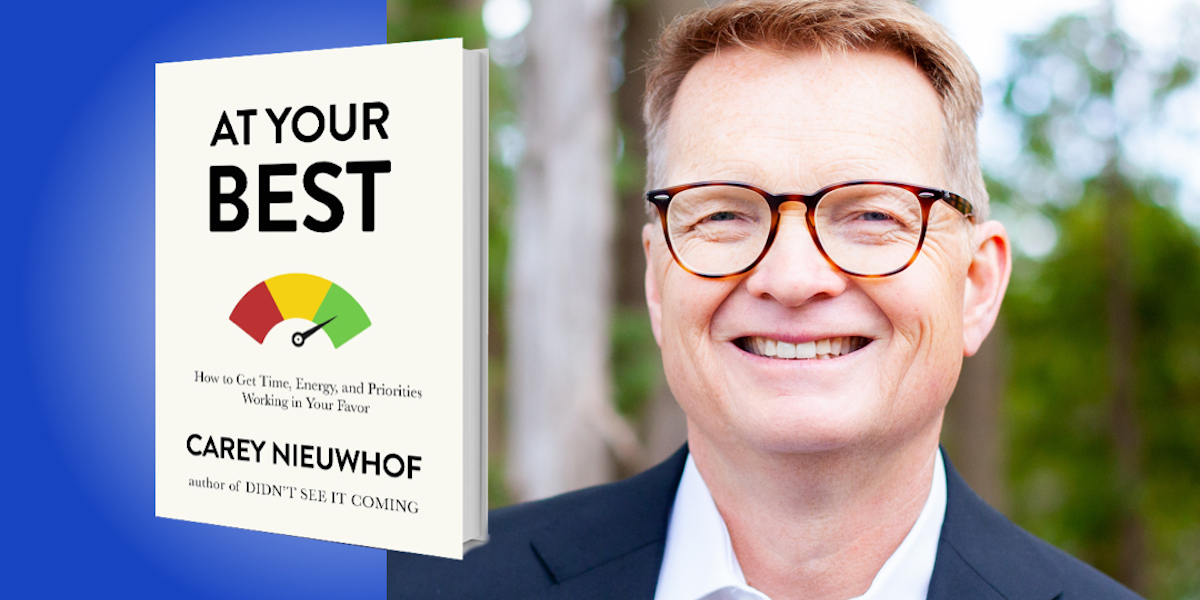Carey Nieuwhof is a former lawyer and the founding pastor of one of the most influential churches in North America, Connexus Church. He is also a recovered victim of burnout. After shutting down from years of chronic, mounting stress and finding a way to cope with that exhaustion and recalibrate his lifestyle, he has become a sought-after conference speaker, podcaster, and thought leader.
Below, Carey shares 5 key insights from his new book, At Your Best: How to Get Time, Energy, and Priorities Working in Your Favor. Listen to the audio version—read by Carey himself—in the Next Big Idea App.
1. You actually have the time.
Before my burnout, I’d regularly claim that I didn’t have time to do things. Audit your own speech and the words of people around you and notice phrases like:
- Sorry, I just don’t have the time.
- I didn’t have a chance to get it done.
- I wasn’t able to finish it.
Do you hear what these statements have in common? They’re not entirely true. They’re really saying, “I could have—I just didn’t.” Or, “I had the time—I just didn’t take it.”
One day, I realized the most productive people in the world get the same amount of time as you and me. This also means that some people are staggeringly great at handling time. What do you wish you had time to do? Work out? Write a book? Start a podcast? Tuck your kids into bed at night? When it comes to time, you and I are rich. In fact, we’re loaded. Time doesn’t discriminate—with the exception of the day you’re born and the day you die, everyone gets the same 24 hours.
“Time doesn’t discriminate—with the exception of the day you’re born and the day you die, everyone gets the same 24 hours.”
So, what’s your dream? You have the same amount of time as anyone else to realize it.
2. Cooperating with your energy levels produces far greater results than competing with them.
Time management is one thing, but energy management is quite another. I’m guessing you’ve noticed this: Even though you have 24 equal hours in the day, not all hours feel equal or produce equally.
You’re wide awake for the 10:00 a.m. meeting, but at 2:30 in the afternoon, you’ve got toothpicks wedged in your eyelids to stay alert for a Zoom session, and you’re jiggling your leg to stay focused. You sprint through some hours, but drag yourself through others.
Underneath that is a truth most of us would rather deny: Most of us have only three to five deeply productive hours in a day when our energy is at its peak. Experts agree that our peak hours are far more limited than we realize. It has nothing to do with IQ or hustle, and everything to do with being human. We simply can’t work at our peak all day long.
Let’s call your peak hours your Green Zone. While everyone is different, my Green Zone happens between 7–11 a.m. most days. Yours might happen in the afternoon or evening, but you’ve got three to five peak hours somewhere. The rest of the day can be divided into Yellow and Red Zones. Your Red Zone happens when your energy level is at its lowest, and you struggle to focus and get anything done. Your Yellow Zone is the balance, with mid-level energy—not terrible, but also not your best.
“Protect your Green Zone by doing your most important work and top priorities then.”
What do you do with this reality? Rather than competing with your energy level as it waxes and wanes, cooperate with it. Protect your Green Zone by doing your most important work and top priorities then. Do moderately important tasks in your Yellow Zone, and the least important tasks in your Red Zone. Or in your Red Zone, call it a day and go for a run or take a nap.
Overall, cooperating with your energy levels produces far greater productivity than competing with them.
3. You’re most likely to neglect your most important work.
What’s the most significant work you can do? What’s your talent, your superpower, the thing you do that most moves the needle at work and in life? Well, strange news: The more naturally skilled you are at something, the easier it is to spend less time on it, not more.
Far too often in my life, I’ve done just that. I whipped something together because I got overwhelmed with so many other things. I threw a talk together in a quarter of the time I should have taken to do it well, and often nobody noticed. That’s a terrible way to steward a gift. It’s also a really bad long-term strategy if you want to fully develop your talent.
I call that “cheating your gift.” You cheat your gift when you use your gift, but never take the time to develop it. Spending thirty to sixty minutes of your peak Green Zone each day reading, studying, and honing your skills can make an astonishing difference. Like compound interest, the real benefits of small investments in your skillset show up years down the road. So use your Green Zone to develop your talent, not just to use it.
“You cheat your gift when you use your gift, but never take the time to develop it.”
4. No one else will ever ask you to accomplish your top priorities.
It’s easy to spend all day at work and accomplish nothing you set out to do. If you look at it honestly, the “oh my goodness, what happened to my day?” phenomenon is not really a mystery. You simply spent your day reacting to everything that came your way.
It’s easy to blame everyone else for a lack of productivity. But these days, I remind myself that everyone who calls, texts, knocks on my door, or asks me for things is just doing what every human being does: trying to move his or her priorities onto my agenda.
That’s just the way life works. Nobody will ever ask you to accomplish your top priorities. One hundred percent of a day can be used up helping other people accomplish their priorities while yours sit unattended. So find your biggest priorities, and dedicate undistracted time in your Green Zone to accomplishing them.
5. The wrong people always want your time. The right people rarely ask for it.
People tend to be the greatest opportunity and the greatest obstacle we face. The people who want your time are rarely the people who should have your time. And the people who should get most of your premium time (top team members, top clients, your spouse, your kids) may not ask you for it. As a result, many of us spend much of our time with the people who drain us, leaving us feeling drained. Meanwhile, the people who energize us rarely get enough attention.
“One hundred percent of a day can be used up helping other people accomplish their priorities while yours sit unattended.”
At work, most leaders spend time with their underperformers: the employee who’s always late to work, or the salesperson who isn’t closing many deals. In our personal lives, it’s easy to spend a lot of our time with drama kings and queens, chronic complainers, or the person who’s always in crisis but doesn’t want to get better. What ties together these kinds of people, says psychologist John Townsend, is that they have a flat learning curve. They’re not being helped by your interaction, and neither are you. As a result, so many us have nothing left to give because we’ve given it all away to people who, honestly, weren’t helped by the interaction.
So what if you flipped it? What if instead of spending 80 percent of your relational time with chronic underperformers or struggling people who never seem to improve, you spent 80 percent of your people-time with top performers and the people closest to you?
That changes so much. First, your top and closest people will be glad you did. Second, you’ll be energized when you spend time with them, as will they. Plus, your best people will often lean in harder and produce better results after you spend time with them. Plus, you’ve released the chronic strugglers to people who can better help them.
In short, invest in your best. You’ll both value it.
To listen to the audio version read by Carey Nieuwhof, download the Next Big Idea App today:































